
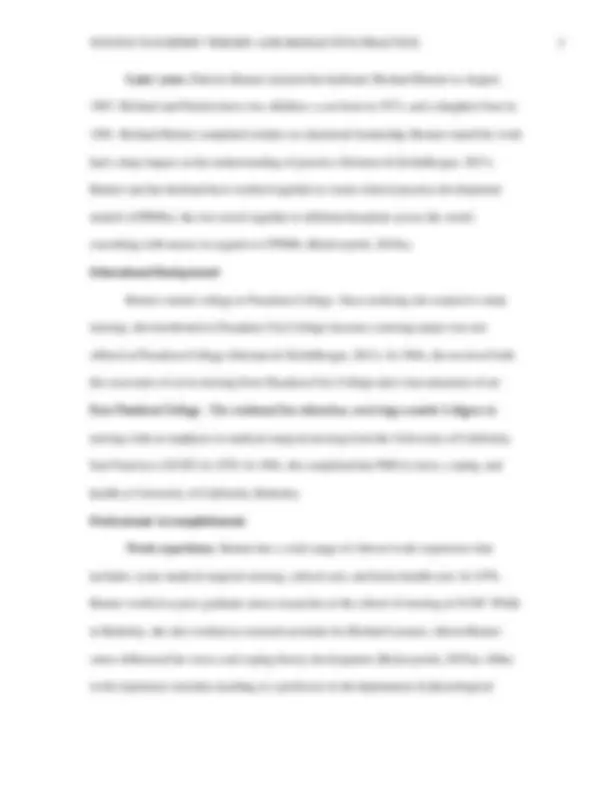
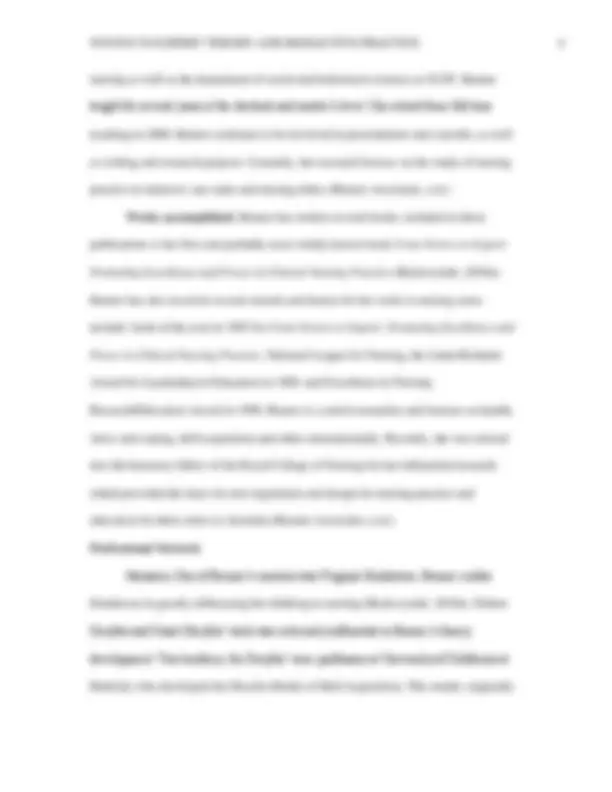
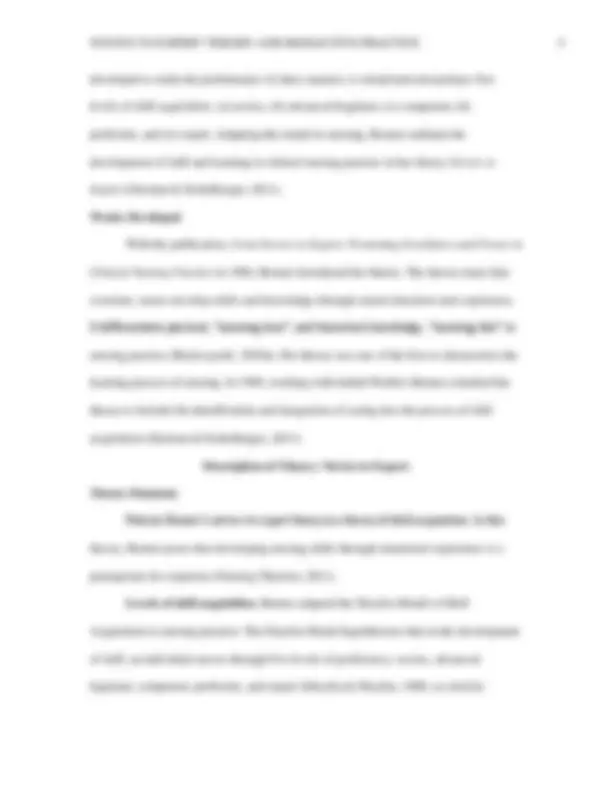
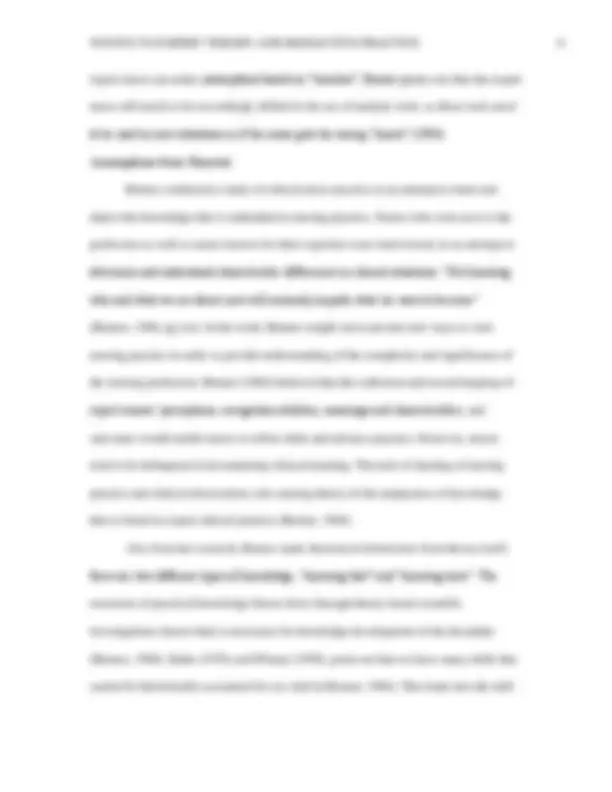
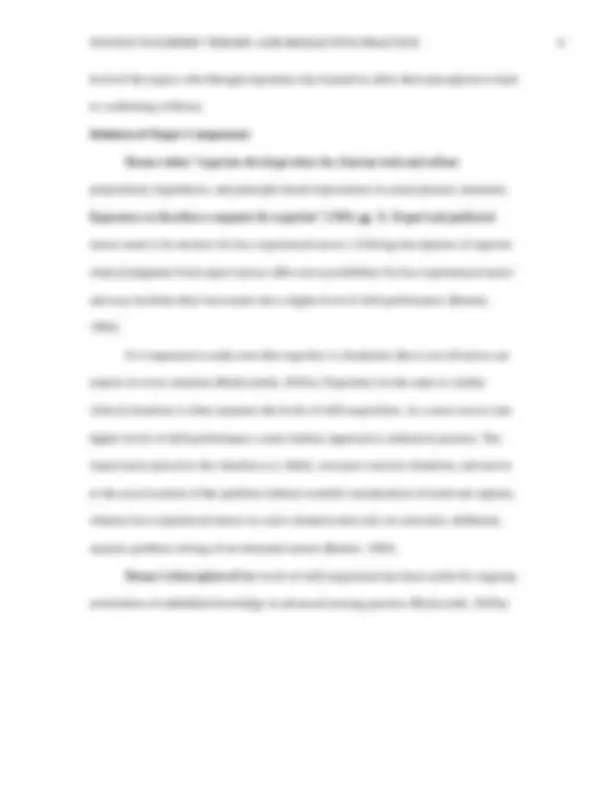
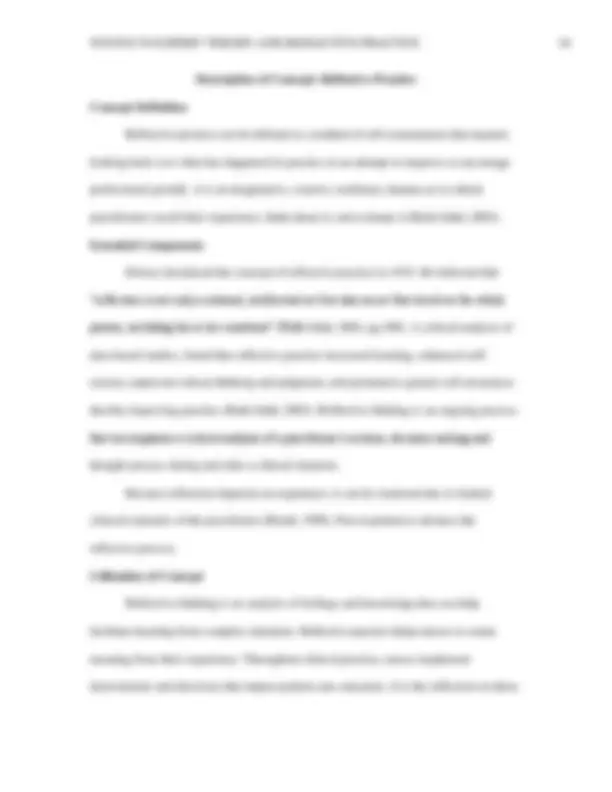
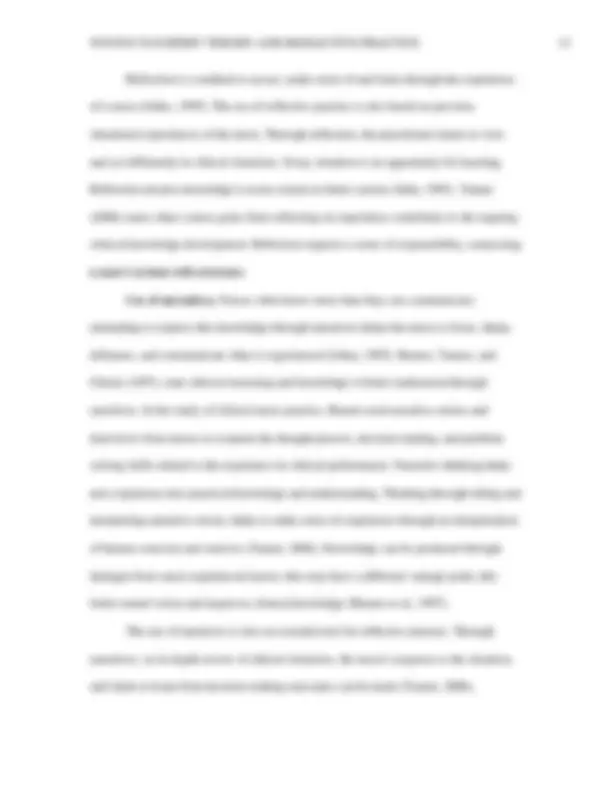
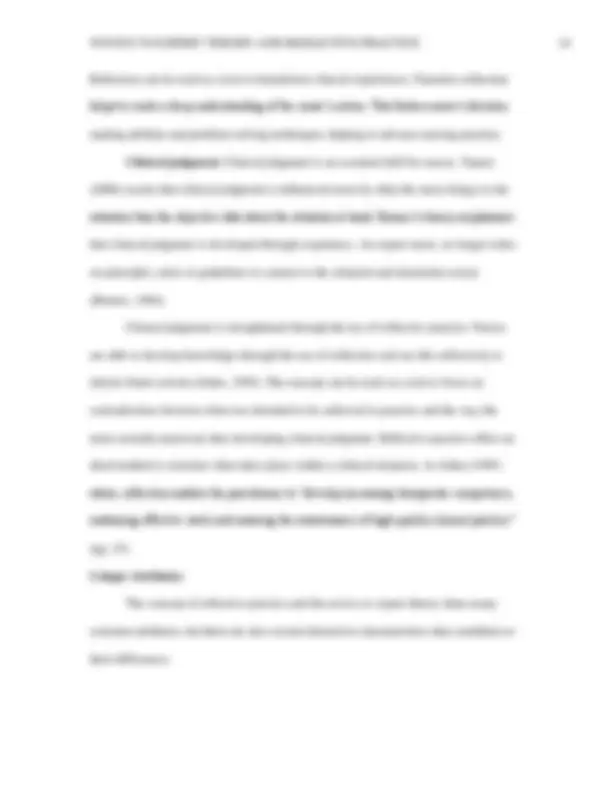
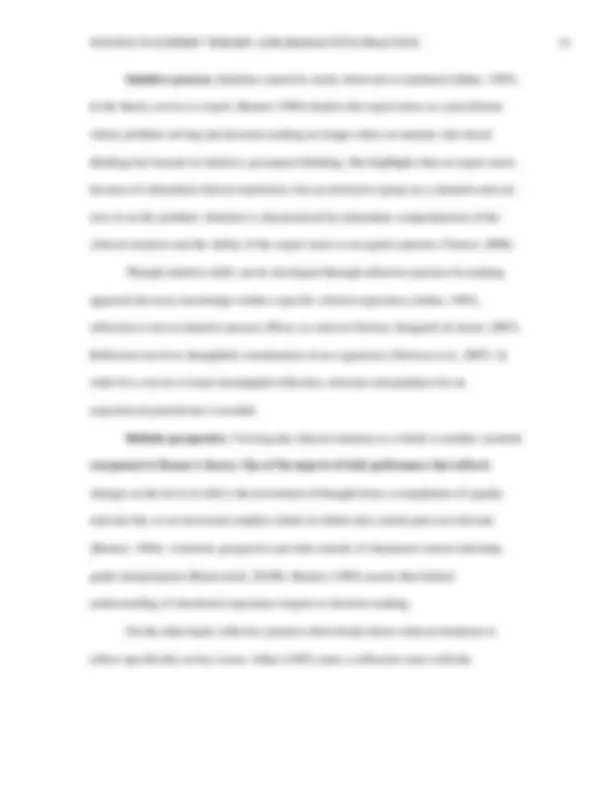
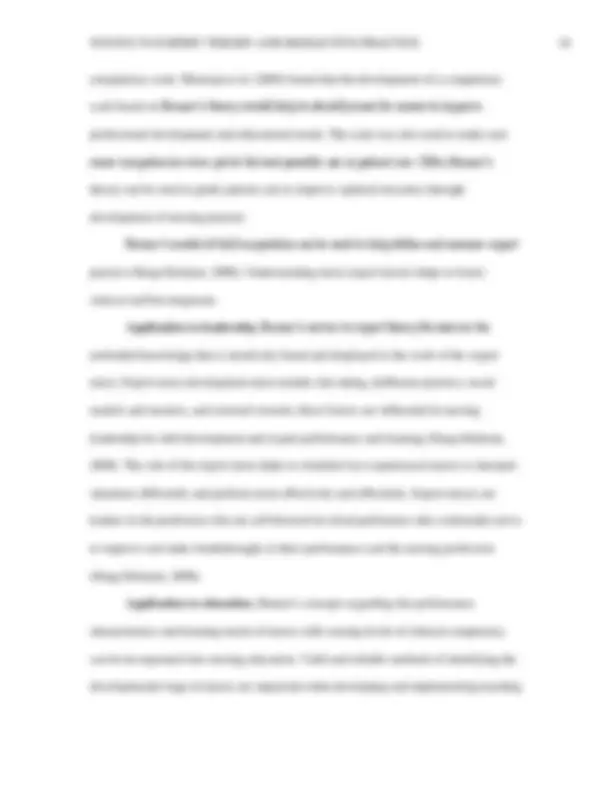
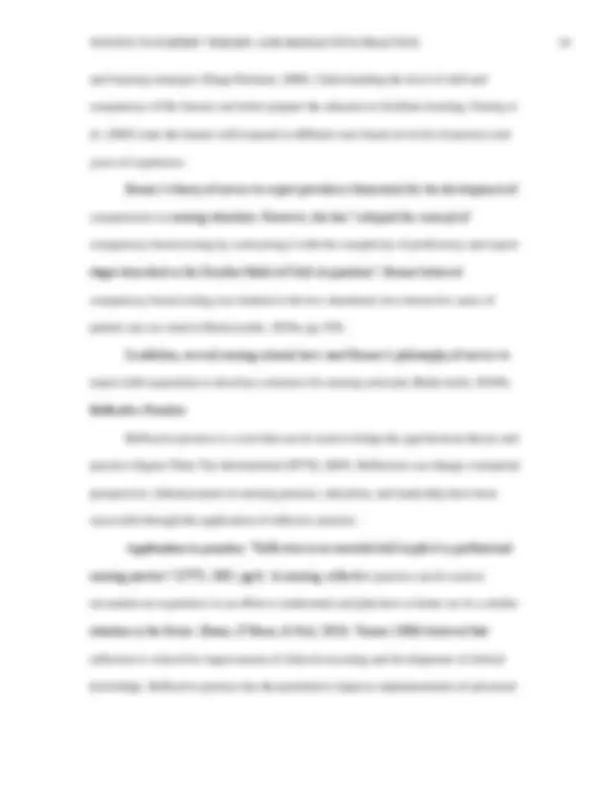
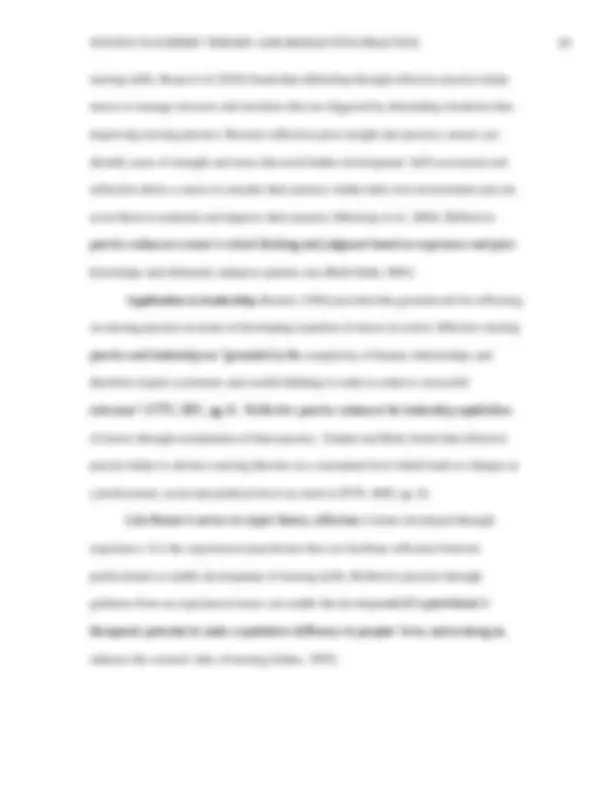
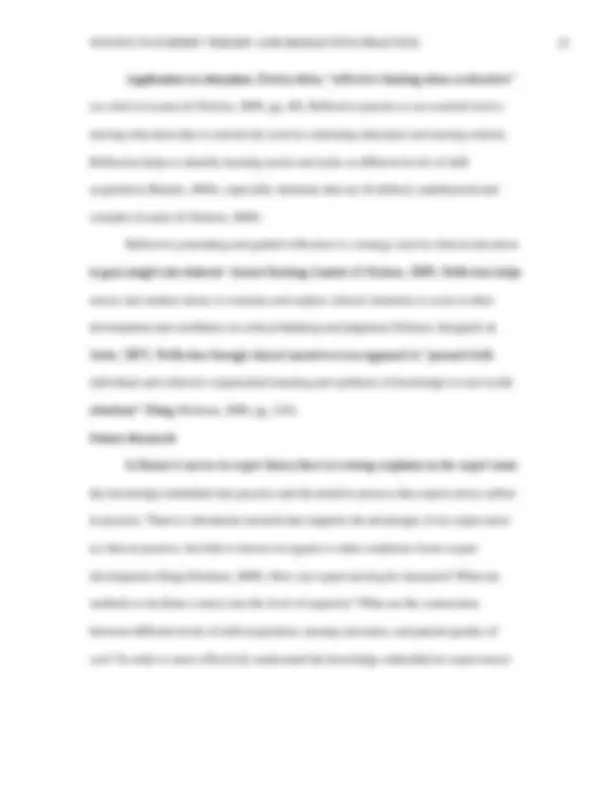
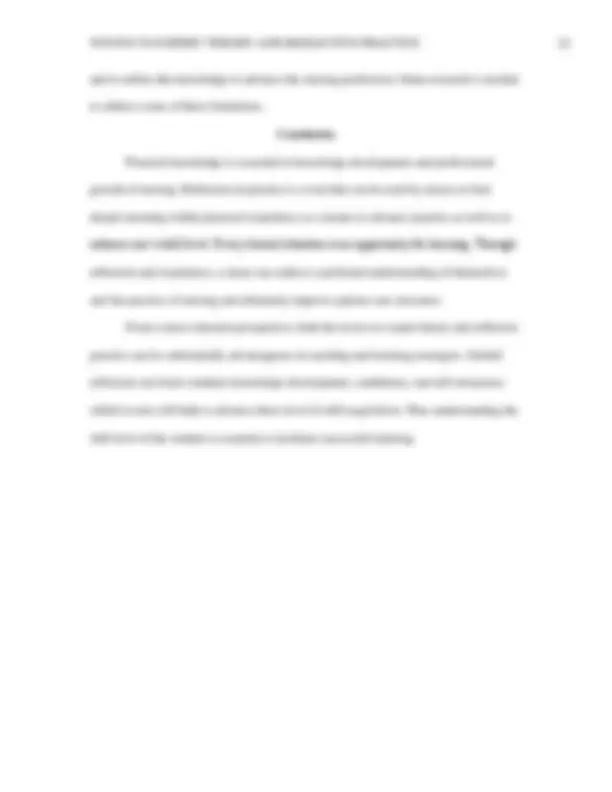
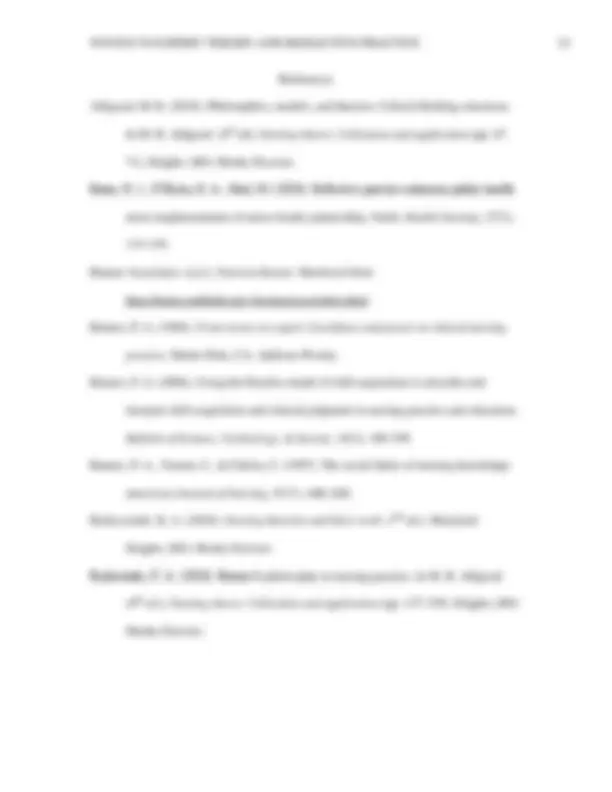
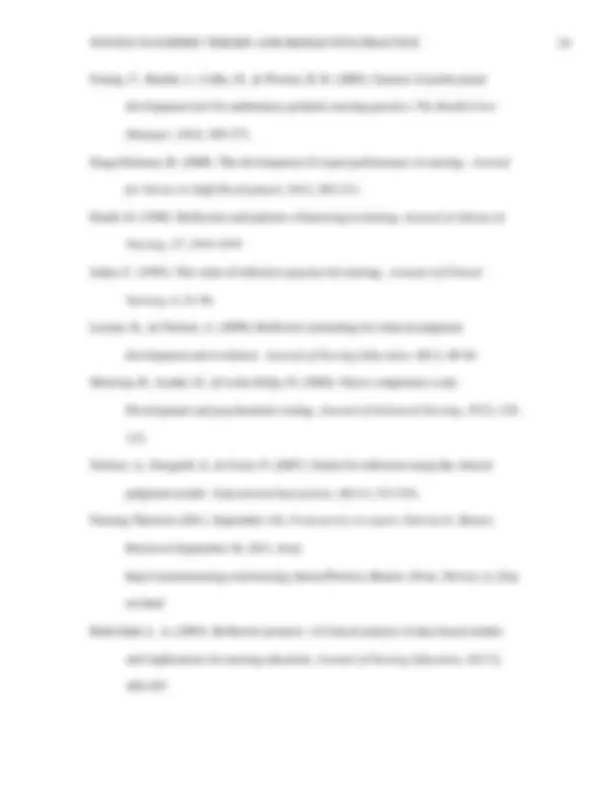
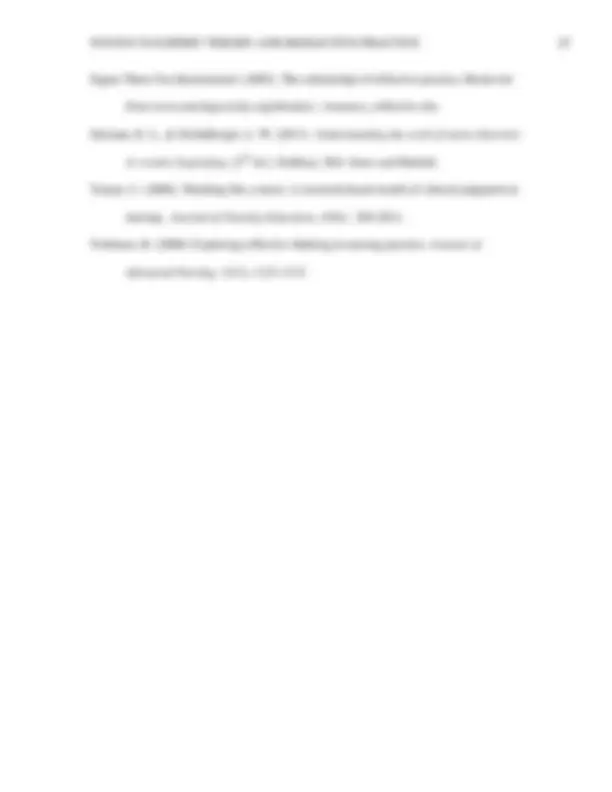


Study with the several resources on Docsity

Earn points by helping other students or get them with a premium plan


Prepare for your exams
Study with the several resources on Docsity

Earn points to download
Earn points by helping other students or get them with a premium plan
Community
Ask the community for help and clear up your study doubts
Discover the best universities in your country according to Docsity users
Free resources
Download our free guides on studying techniques, anxiety management strategies, and thesis advice from Docsity tutors
theory, Benner poses that developing nursing skills through situational experience is a prerequisite for expertise (Nursing Theories, 2011). Levels of skill ...
Typology: Lecture notes
1 / 25

This page cannot be seen from the preview
Don't miss anything!


















Running head: NOVICE TO EXPERT THEORY AND REFLECTIVE PRACTICE 1
Benner’s Novice to Expert Theory and the Concept Reflective Practice: A Comparative Analysis Bridget Sunkes SUNY Institute of Technology
Benner’s Novice to Expert Theory and the Concept Reflective Practice: A Comparative Analysis Nursing is a unique profession in which the experience of the practitioner is the most significant attribute to professional growth and knowledge development. Patricia Benner’s theory, novice to expert, and the concept of reflective practice both validate this idea. Benner utilized reflection within her study of the nursing profession in order to depict the unique characteristics and knowledge embedded in the experience of the nurse. Both the theory and the concept have been employed to enhance knowledge development, professional growth and innovative changes within the nursing profession. The purpose of this paper is to profoundly explore Benner’s theory: novice to expert and the concept of reflective practice. The paper also depicts the unique and similar attributes within the theory and concept as well as there utilization within nursing practice, education, and leadership. Presentation of Nurse Theorist: Patricia Benner Family Life Early life. August, 1942 Patricia Benner was born in Hampton, Virginia to parents: Shirley and Clint Sawyer. Patricia Benner is the middle child, she has two sisters. The Sawyer family moved to California, where Patricia and her sisters completed high school. Patricia’s parents divorced when she was a sophomore in high school; she reported this was a very difficult time for her and her family (Sitzman & Eichelberger, 2011). Her interest in becoming a nurse sparked when she was working as an admitting clerk at a local hospital while in college.
nursing as well as the department of social and behavioral sciences at UCSF. Benner taught for several years at the doctoral and master’s level. She retired from full time teaching in 2008. Benner continues to be involved in presentations and consults, as well as writing and research projects. Currently, her research focuses on the study of nursing practice in intensive care units and nursing ethics (Benner Associates, n.d.) Works accomplished. Benner has written several books, included in these publications is her first and probably most widely known book From Novice to Expert: Promoting Excellence and Power in Clinical Nursing Practice (Brykczynski, 2010a). Benner has also received several awards and honors for her work in nursing some include: book of the year in 1985 for From Novice to Expert: Promoting Excellence and Power in Clinical Nursing Practice , National League for Nursing, the Linda Richards Award for Leadership in Education in 1989, and Excellence in Nursing Research/Education Award in 1990. Benner is a noted researcher and lecturer on health, stress and coping, skill acquisition and ethics internationally. Recently, she was elected into the honorary fellow of the Royal College of Nursing for her influential research; which provided the basis for new legislation and design for nursing practice and education for three states in Australia (Benner Associates, n.d.). Professional Network Mentors. One of Benner’s mentors was Virginia Henderson. Benner credits Henderson in greatly influencing her thinking in nursing (Brykczynski, 2010a). Hubert Dreyfus and Stuart Dreyfus’ work was extremely influential in Benner’s theory development. Two brothers, the Dreyfus’ were professors at University of California at Berkeley who developed the Dreyfus Model of Skill Acquisition. This model, originally
developed to study the performance of chess masters, is situational and portrays five levels of skill acquisition: (a) novice, (b) advanced beginner, (c) competent, (d) proficient, and (e) expert. Adapting this model to nursing, Benner outlined the development of skill and learning in clinical nursing practice in her theory Novice to Expert (Sitzman & Eichelberger, 2011). Works Developed With the publication, From Novice to Expert: Promoting Excellence and Power in Clinical Nursing Practice in 1984, Benner introduced her theory. The theory states that overtime, nurses develop skills and knowledge through sound education and experience. It differentiates practical, “knowing how”, and theoretical knowledge, “knowing that” in nursing practice (Brykczynski, 2010a). Her theory was one of the first to characterize the learning process of nursing. In 1989, working with Judith Wrubel, Benner extended her theory to include the identification and integration of caring into the process of skill acquisition (Sitzman & Eichelberger, 2011). Description of Theory: Novice to Expert Theory Elements Patricia Benner’s novice to expert theory is a theory of skill acquisition. In this theory, Benner poses that developing nursing skills through situational experience is a prerequisite for expertise (Nursing Theories, 2011). Levels of skill acquisition. Benner adapted the Dreyfus Model of Skill Acquisition to nursing practice. The Dreyfus Model hypothesizes that in the development of skill, an individual moves through five levels of proficiency: novice, advanced beginner, competent, proficient, and expert (Dreyfus & Dreyfus, 1980; as cited by
principles based on experience and begins the use of these experiences to guide their actions (Nursing Theories, 2011). Competent. A competent nurse is a nurse who has gained two to three years of experience in the same work area or in similar day-to-day situations (Benner, 1984). Benner states that competence develops when the nurse starts to see or plan his or her actions in terms of long-range goals. The competent nurse, unlike the novice and advanced beginner nurse, plans actions based on the pertinent aspects of the situation instead of including all aspects. For the competent nurse “a plan establishes perspective, and the plan is based on considerable conscious, abstract, analytic contemplation of the problem” (Benner, 1984, pg. 26). It is the planning, that is characteristic of this skill level; it is what helps the competent nurse to be more efficient and organized. Proficient. The proficient nurse perceives situations as a whole instead of in terms of aspects. According to Benner (1984), “perspective is not thought out but “presents itself” based upon experience and recent events” (pg. 27). Perception is fundamental to the proficient nurse. In this level, the nurse understands more holistically, thus improving decision making (Nursing Theories, 2011). The proficient nurse has learned from experience typical events to expect in a clinical situation and how plans need to be modified to response to these events (Benner, 1984). Expert. The next level in the skill acquisition model is the expert nurse. According to Benner (1984), the expert nurse has a deep connection and understanding of the situation. The expert no longer relies on analytic principle; instead the expert has an intuitive grasp of situations that is utilized to determine actions. The performance of the expert nurse is fluid, flexible, and highly proficient (Nursing Theories, 2011). Though the
expert nurse can make assumptions based on “hunches”, Benner points out that the expert nurse still needs to be exceedingly skilled in the use of analytic tools, as these tools need to be used in new situations or if the nurse gets the wrong “hunch” (1984). Assumptions from Theorist Benner conducted a study of clinical nurse practice in an attempt to learn and depict the knowledge that is embedded in nursing practice. Nurses who were new to the profession as well as nurses known for their expertise were interviewed, in an attempt to determine and understand characteristic differences in clinical situations. “Not knowing who and what we are about now will seriously impede what we want to become” (Benner, 1984, pg xxi). In her work, Benner sought out to present new ways to view nursing practice in order to provide understanding of the complexity and significance of the nursing profession. Benner (1984) believed that the collection and record keeping of expert nurses’ perceptions, recognition abilities, meanings and characteristics, and outcomes would enable nurses to refine skills and advance practice. However, nurses tend to be delinquent in documenting clinical learning. The lack of charting of nursing practice and clinical observations robs nursing theory of the uniqueness of knowledge that is found in expert clinical practice (Benner, 1984). Also from her research, Benner made theoretical distinctions from theory itself; there are two different types of knowledge, “knowing that” and “knowing how”. The extension of practical knowledge (know-how) through theory based scientific investigations (know-that) is necessary for knowledge development of the discipline (Benner, 1984). Kuhn (1970) and Polanyi (1958), point out that we have many skills that cannot be theoretically accounted for (as cited in Benner, 1984). This leads into the skill
Description of Concept: Reflective Practice Concept Definition Reflective practice can be defined as a method of self-examination that requires looking back over what has happened in practice in an attempt to improve or encourage professional growth; it is an imaginative, creative, nonlinear, human act in which practitioners recall their experience, think about it, and evaluate it (Ruth-Sahd, 2003). Essential Components Dewey introduced the concept of reflective practice in 1933. He believed that “reflection is not only a rational, intellectual act but also an act that involves the whole person, including his or her emotions” (Ruth-Sahd, 2003, pg 498). A critical-analysis of data-based studies, found that reflective practice increased learning, enhanced self- esteem, improved critical thinking and judgment, and promoted a greater self-awareness thereby improving practice (Ruth-Sahd, 2003). Reflective thinking is an ongoing process that encompasses a critical analysis of a practitioner’s actions, decision making and thought process during and after a clinical situation. Because reflection depends on experience, it can be restricted due to limited clinical exposure of the practitioner (Heath, 1998). Past experiences advance the reflective process. Utilization of Concept Reflective thinking is an analysis of feelings and knowledge that can help facilitate learning from complex situations. Reflective practice helps nurses to create meaning from their experience. Throughout clinical practice, nurses implement interventions and decisions that impact patient care outcomes. It is the reflection on these
decisions that enables practitioner to develop professional growth. Many times it is the reflection on previous events that helps nurses to plan actions on subsequent clinical situations (Teekman, 2000). Nursing educators can help facilitate their students learning through guided reflective practice. Educators who encouraged students to openly communicate and recognize keys to reflective practice more successfully prepared nursing students for the complex world of nursing (Ruth-Sahd, 2003). Relationship of Novice to Expert Theory and Reflective Practice
Common Attributes
Benner’s novice to expert theory and the concept of reflective practice share many similar characteristics that contribute to the development of nursing knowledge and the growth of the nursing profession.
Acquisition of skills. Benner’s theory articulates skill acquisition that is useful in depicting the embedded knowledge in advanced nursing practice (Brykcznski, 2010b). The theory asserts the concept that nurses “develop skills and understanding of patient care over time through a sound educational base as well as a multitude of experiences” (Nursing Theories, 2011, pg 1). Each level of skill acquisition builds on the previous one; abstract principles are refined and expanded as the nurse gains clinical experience. By exploring the role and decision making process of a proficient or expert nurse, less experienced nurses can further develop their clinical reasoning and scope of practice (Benner, 1984).
Reflection is a method to access, make sense of and learn through the experience of a nurse (Johns, 1995). The use of reflective practice is also based on previous situational experiences of the nurse. Through reflection, the practitioner learns to view and act differently in clinical situations. Every situation is an opportunity for learning. Reflection ensures knowledge is more certain in future actions (John, 1995). Tanner (2006) states what a nurse gains from reflecting on experience contributes to the ongoing clinical knowledge development. Reflection requires a sense of responsibility, connecting a nurse’s actions with outcomes. Use of narratives. Nurses often know more than they can communicate; attempting to express this knowledge through narratives helps the nurse to focus, shape, influence, and communicate what is experienced (Johns, 1995). Benner, Tanner, and Chesla (1997), state clinical reasoning and knowledge is better understood through narratives. In her study of clinical nurse practice, Benner used narrative stories and interviews from nurses to examine the thought process, decision making, and problem solving skills related to the experience in clinical performance. Narrative thinking helps turn experience into practical knowledge and understanding. Thinking through telling and interpreting narrative stories, helps to make sense of experience through an interpretation of human concerns and motives (Tanner, 2006). Knowledge can be produced through dialogue from more experienced nurses who may have a different vantage point; this limits tunnel vision and improves clinical knowledge (Benner et al., 1997). The use of narratives is also an essential tool for reflective practice. Through narratives: an in-depth review of clinical situations, the nurse's response to the situation, and intent to learn from decision making outcomes can be made (Tanner, 2006).
Reflection can be used as a tool to breakdown clinical experiences. Narrative reflection helps to create a deep understanding of the nurse’s action. This fosters nurse’s decision making abilities and problem solving techniques, helping to advance nursing practice. Clinical judgment. Clinical judgment is an essential skill for nurses. Tanner (2006) asserts that clinical judgment is influenced more by what the nurse brings to the situation than the objective data about the situation at hand. Benner’s theory emphasizes that clinical judgment is developed through experience. An expert nurse, no longer relies on principles, rules or guidelines to connect to the situation and determine action (Benner, 1984). Clinical judgment is strengthened through the use of reflective practice. Nurses are able to develop knowledge through the use of reflection and use this reflexively to inform future actions (Johns, 1995). The concept can be used as a tool to focus on contradictions between what was intended to be achieved in practice and the way the nurse actually practiced, thus developing clinical judgment. Reflective practice offers an ideal method to structure what takes place within a clinical situation. As Johns (1995) states, reflection enables the practitioner to “develop increasing therapeutic competence, sustaining effective work and ensuring the maintenance of high quality clinical practice” (pg. 23). Unique Attributes The concept of reflective practice and the novice to expert theory share many common attributes, but there are also several distinctive characteristics that contribute to their differences.
description of the experience from which key issues within the experience can be focused on for reflection; there is always a movement from the whole to its parts. Analytic thinking. Analytic thinking is necessary in all levels of skill acquisition. Although Benner’s work emphasized the knowledge development obtained through experience, she also maintains the importance of analytic thinking in practice. Tanner (2006) points out that analytic process is used when one lacks the necessary essential knowledge; when there is a mismatch between what is expected and what happens, as well as when there are multiple options. At times, the only way to problem solve is through analytical thinking (Benner, 1984). Analytic tools are the back bone for clinical decision making. These tools are embedded in expert nurses, enabling them to transition into the use of an intuitive process. Reflection on the other hand does not rely on analytic thinking. It is a process of reflecting on action. Reflection is a tool to examine the choices that were made in a clinical situation and the outcomes of those choices. “Unlike universal, static, and context free nature of analytic knowledge, reflective knowledge is particular, dynamic, and context bound” (Johns, 1995, pg 24). Self-awareness. Reflective practice builds self-awareness through the reflection on one’s decision making in clinical practice. By promoting greater self-awareness, the nurse will improve their practice by enhancing self-esteem and critical thinking (Ruth- Sahd, 2003). Therefore, one can assert through more experiences, the nurse will develop a higher level of learning and become more aware of one self in practice. This differs in the development of experience in Benner’s theory. For the expert nurse, experience has developed a deep understanding of clinical situations (Nursing
Theories, 2011); the nurse embodies an intuitive thinking process. As the nurse develops skill they become less aware of themselves, and instead perceive the situation as a whole. Application of Benner’s Novice to Expert Theory and Reflective Practice Benner’s Novice to Expert Theory The novice to expert theory has provided a highly valued framework for advanced development of the nursing profession. This philosophy has been a foundation in practice, education, and leadership development in the nursing profession. Application to practice. Benner’s development of the novice to expert theory has been used to guide nurse practice and create innovative changes to the profession (Alligood, 2010). Benner’s philosophical view of nursing has transformed the view of the nursing practice. The emphasis on the nature of nursing practice, specifically how knowledge of practice is acquired and developed overtime has been utilized in developing practice models, advances in nursing research, as well as orientation and preceptor programs in acute care settings as well as non-acute settings world-wide (Alligood, 2010). Benner’s work has been used extensively as rationale for career development and continuing education of nurses. It “focuses on developing and understanding perceptual acuity, clinical judgment, skilled know-how, ethical comportment, and ongoing experiential learning” (Brykcznski, 2010b, pg 141). The theory has helped to create foundations for building and improving skills of the primary care nurse through examining the acquisition of nurse’s experience (Fennig, Bender, Colby, &Werner, 2005,). An example of the use of Benner’s theory in practice is in the work of Meretoja, Isoaho, and Leino-Kilpi. Meretoja et al. used Benner’s theory to develop a nurse
and learning strategies (Haag-Heitman, 2008). Understanding the level of skill and competency of the learner can better prepare the educator to facilitate learning. Fennig et al. (2005) state the learner will respond to different cues based on levels of practice and years of experience. Benner’s theory of novice to expert provides a framework for the development of competencies in nursing education. However, she has “critiqued the concept of competency-based testing by contrasting it with the complexity of proficiency and expert stages described in the Dreyfus Model of Skill Acquisition”; Benner believed competency based testing was limited to the less situational, less interactive areas of patient care (as cited in Brykczynski, 2010a, pg 150). In addition, several nursing schools have used Benner’s philosophy of novice to expert skill acquisition to develop a structure for nursing curricula (Brykcznski, 2010b). Reflective Practice Reflective practice is a tool that can be used to bridge the gap between theory and practice (Sigma Theta Tau International [STTI], 2005). Reflection can change conceptual perspectives. Enhancements in nursing practice, education, and leadership have been successful through the application of reflective practice. Application to practice. “Reflection is an essential skill implicit in professional nursing practice” (STTI, 2005, pg 6). In nursing, reflective practice can be used to reexamine an experience in an effort to understand and plan how to better act in a similar situation in the future. (Beam, O’Brien, & Neil, 2010). Tanner (2006) believed that reflection is critical for improvement of clinical reasoning and development of clinical knowledge. Reflective practice has the potential to improve implementation of advanced
nursing skills. Beam et al (2010) found that debriefing through reflective practice helps nurses to manage stressors and emotions that are triggered by demanding situations thus improving nursing practice. Because reflection gives insight into practice, nurses can identify areas of strength and areas that need further development. Self assessment and reflection allows a nurse to consider their practice within their own environment and can assist them to maintain and improve their practice (Meretoja et al., 2004). Reflective practice enhances a nurse’s critical thinking and judgment based on experience and prior knowledge and ultimately enhances patient care (Ruth-Sahd, 2003). Application to leadership. Benner (1984) provided the groundwork for reflecting on nursing practice in terms of developing expertise of nurses in action. Effective nursing practice and leadership are “grounded in the complexity of human relationships and therefore require systematic and careful thinking in order to achieve successful outcomes” (STTI, 2005, pg. 6). Reflective practice enhances the leadership capabilities of nurses through examination of their practice. Emden and Reid, found that reflective practice helps to advance nursing theories at a conceptual level which leads to changes at a professional, social and political level (as cited in STTI, 2005, pg. 8). Like Benner’s novice to expert theory, reflection is better developed through experience. It is the experienced practitioner that can facilitate reflection between professionals to enable development of nursing skills. Reflective practice through guidance from an experienced nurse can enable the development of a practitioner’s therapeutic potential to make a qualitative difference to peoples’ lives, and in doing so, enhance the societal value of nursing (Johns, 1995).